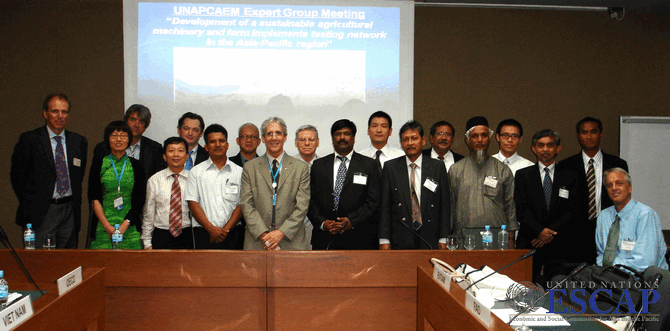Expert Group Meeting (EGM): Development of a sustainable agricultural machinery and farm implements testing network in the Asia-Pacific region, 26 July 2011, Bangkok, Thailand

UNAPCAEM held an Expert Group Meeting (EGM) attended by key experts from Asia-Pacific agricultural mechanization centres. Experts from Bangladesh, China, Fiji, India, Indonesia, Malaysia, Myanmar, Nepal, Papua New Guinea, Philippines, Russian Federation, Sri Lanka, Thailand, and Viet Nam were joined by specialists on agricultural testing codes from the Organization for Economic Cooperation (OECD), the European Network for Testing of Agricultural Machinery (ENTAM) and an expert from FAO’s Rural Infrastructure and Agro-Industries Division in Rome.
Held in Bangkok, Thailand, on 26 July 2011, the EGM realized the formulation of a technical working group made up of selected ESCAP member countries and a steering committee to take substantive steps on the establishment of an Asian and Pacific Network for Testing of Agricultural Machinery (ANTAM). The EGM marked a long awaited and significant step based on a Roundtable Forum for the Regional Agricultural Machinery Manufacturers/Distributors Associations held in Seoul, Republic of Korea, in 2006, with an aim to promote synergy in the Asia-Pacific region in the application of uniform testing procedures and safety standards of agricultural machinery.
UNAPCAEM was identified to house the proposed Network and is now working closely with ENTAM (the European Network for Testing of Agricultural Machines, a network among the official testing stations belonging to European countries). ENTAM countries have signed an Agreement providing common activities with the aim of establishing and mutually recognizing tests carried out on performance and safety. The purpose of ENTAM is to promote the cooperation of its members to optimize activities, avoid duplication of work and costs by testing machinery in different European countries, obtain more neutral test results, make better use of test rigs and test implements by testing only certain machinery at certain designated testing stations and provide independent information / better service to manufacturers, farmers and dealers.
In addition to working with ENTAM, UNAPCAEM is in close collaboration with OECD’s Tractor Codes programme. The OECD programme works via country National Authorities designated for implementing the Codes and performs tractor tests according to common harmonised procedures with results submitted to OECD for approval. By testifying the quality of the traded material, the approvals granted by the OECD facilitate international trade. This programme, with decades of experience, is sharing its experiences and providing technical input in the development of ANTAM.
Given its track record, FAO is not only providing technical advice on establishing a network for testing agricultural machinery but is now working out collaboration modalities on producing an Agricultural Mechanization Strategy (AMS) for a soon-to-be identified Asia-Pacific country. The purpose of an AMS is to encourage member countries to take stock of their situation and analyse farmers’ needs, institutional arrangements in their country and the availability of services to meet these needs.
The EGM also shared a survey of current agricultural testing stations in the Asia-Pacific region followed by lively country discussion on various modalities for establishing ANTAM.
